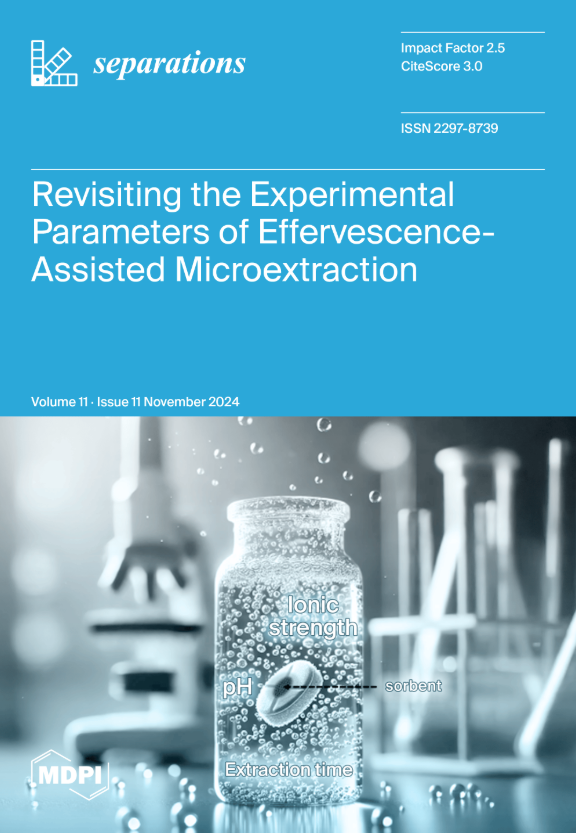超声辅助乳化微萃取法测定葡萄酒中挥发性物质的研究
IF 2.7
4区 工程技术
Q3 CHEMISTRY, ANALYTICAL
引用次数: 0
摘要
建立了超声辅助乳化微萃取法(USAEME)分析葡萄酒中挥发性物质的快速简便方法。建立全因子24筛选设计,考察影响挥发性成分提取的主要因素,即提取溶剂体积、超声时间、含盐量和ph,并采用i -最优设计对影响显著的因素进行优化。在提取溶剂体积为200 μL、盐含量为5% m/v的条件下,各参数的最优值均可得到。结果表明,优化后的方法线性关系良好,除d-柠檬烯和对伞花烯外,其余样品的重复性均低于8.4%,R2均大于0.995。乙酯类、乙酸酯类、醇类和萜类醇(芳樟醇、α-松油醇)的回收率均高于82%。三种单萜烯(d-柠檬烯、γ-萜烯、对伞花烯)的提取率在70.5% ~ 88.9%之间。该方法有效地应用于选定的酿酒酵母菌的实验室规模发酵过程中挥发性化合物的分析。本文章由计算机程序翻译,如有差异,请以英文原文为准。
Development of an Ultrasound-Assisted Emulsification Microextraction Method for the Determination of Volatile Compounds in Wines
A fast and simple method based on ultrasound-assisted emulsification microextraction (USAEME) was developed for the analysis of volatile compounds in wines. A full factorial 24 screening design was built to investigate the main factors affecting the extraction of volatile components, namely the volume of extraction solvent, sonication time, salt content, and pH. Then, the factors with significant effects were optimized using an I-optimal design. The optimal value for all the variables studied was reached under the following experimental conditions: volume of extraction solvent 200 μL and salt content 5% m/v. The suitability of the optimized method was evaluated, resulting in very good linearity with coefficients of determination (R2) higher than 0.995 in all cases, while repeatability was lower than 8.4% except for d-limonene and p-cymene. Recoveries higher than 82% were observed for the groups of ethyl esters, acetate esters, alcohols, and terpenoid alcohols (linalool, α-terpineol). The recovery of acids ranged from 70.5% to 88.9%, whereas the three monoterpenes studied (d-limonene, γ-terpinene, p-cymene) were not extracted satisfactorily. The proposed method was effectively applied for the analysis of volatile compounds in laboratory-scale fermentations with selected strains of Saccharomyces cerevisiae.
求助全文
通过发布文献求助,成功后即可免费获取论文全文。
去求助
来源期刊

Separations
Chemistry-Analytical Chemistry
CiteScore
3.00
自引率
15.40%
发文量
342
审稿时长
12 weeks
期刊介绍:
Separations (formerly Chromatography, ISSN 2227-9075, CODEN: CHROBV) provides an advanced forum for separation and purification science and technology in all areas of chemical, biological and physical science. It publishes reviews, regular research papers and communications. Our aim is to encourage scientists to publish their experimental and theoretical results in as much detail as possible. There is no restriction on the length of the papers. The full experimental details must be provided so that the results can be reproduced. There are, in addition, unique features of this journal:
Manuscripts regarding research proposals and research ideas will be particularly welcomed.
Electronic files and software regarding the full details of the calculation and experimental procedure, if unable to be published in a normal way, can be deposited as supplementary material.
Manuscripts concerning summaries and surveys on research cooperation and projects (that are funded by national governments) to give information for a broad field of users.
The scope of the journal includes but is not limited to:
Theory and methodology (theory of separation methods, sample preparation, instrumental and column developments, new separation methodologies, etc.)
Equipment and techniques, novel hyphenated analytical solutions (significantly extended by their combination with spectroscopic methods and in particular, mass spectrometry)
Novel analysis approaches and applications to solve analytical challenges which utilize chromatographic separations as a key step in the overall solution
Computational modelling of separations for the purpose of fundamental understanding and/or chromatographic optimization
 求助内容:
求助内容: 应助结果提醒方式:
应助结果提醒方式:


